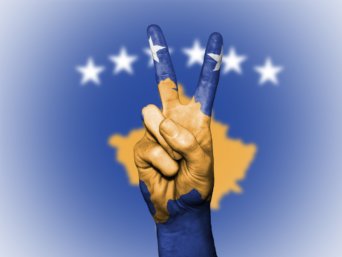- About
- Topics
- Picks
- Audio
- Story
- In-Depth
- Opinion
- News
- Donate
-
Signup for our newsletterOur Editors' Best Picks.Send
Read, Debate: Engage.

| topic: | Rule of Law |
|---|---|
| located: | Kosovo, Serbia |
| editor: | Katarina Panić |
It has been over twelve years since Kosovo proclaimed its independence from Serbia. Ever since, the seventh and youngest state formed from former Yugoslavia has been seeking international memberships, while Serbia campaigns for derecognition. Both governments temporarily paused these activities to meet at the White House today, June 27, for the restart of talks.
Over the years, the international community facilitated dialogue to solve the Kosovo-Serbia dispute with no success nor a vague final goal. The talks were suspended in 2018 after Kosovo imposed a 100 per cent tariff on imported products of Serbian origin. It was a response to Serbia's campaign to prevent Kosovo from gaining membership in UNESCO and Interpol. The newly established mediation has two phases for the dialogue: the first one focused on the economy and led by the U.S., and the second one focused on political issues and is led by the EU.
The EU has recognised Kosovo except for five non-recognising member states. The newest EU special envoy to the Western Balkans is Miroslav Lajčak. The U.S. supports an independent Kosovo that is recognised by Serbia. Richard Grenell is president Donald Trump's special envoy for Serbia-Kosovo dialogue. Russia campaigns the solution that has to be acceptable to Belgrade approved by the UN Security Council. It has no special representative. It has veto power on which Serbia relies mostly. Kosovo itself is deeply divided on the way forward.
The bombastic headlines about the secret plan, hidden agenda or backroom dealing refer to talks about possible solutions. A land swap would mean that Serbia receives portions of northern Kosovo for lesser parts of southern Serbia. Extraterritorial status for Serbian Orthodox churches is a condition sine qua non. A supra-institutional association of municipalities with Serbian majority in Kosovo is also negotiable, although this body previously had existed and then cancelled by Kosovo's Constitutional Court.
The country has an asterisk in its name: Kosovo*. It is usually accompanied with a footnote saying "this designation is without prejudice to positions on status and is in line with UN Security Council resolution 1244 and the International Court of Justice Opinion on the Kosovo declaration of independence."
The Serbian delegations refuse to participate in international events if the name Kosovo is written without an asterisk. Today the question is if Washington is going to be more successful than Brussels in solving the unfinished business in the Western Balkans.
Image by David Peterson